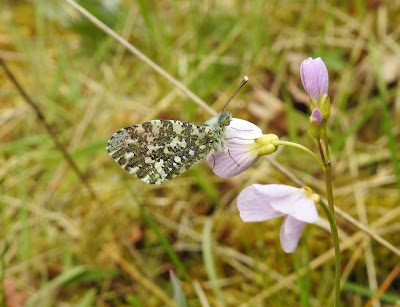On Tuesday I had a survey of one of my woodland plantation sites in Cumbria, this time along the north shore of Morecambe Bay, and very much north of home. It's a quiet time of year now, bird-wise, with adults busy feeding young and migration more or less ground to a halt. Mind you, in just four weeks time it will be Autumn again! And this quietness was revealed in my survey results with just a female Reed Bunting, a Bullfinch, two singing Blackcaps, two singing Sedge Warblers, a Siskin and two Tree Sparrows of minimal interest to you dear reader.
When I am in this neck of the woods I like to call at the Cumbria Wildlife Trust reserve Foulshaw Moss, as it is a cracking reserve and I really love it there. The only slight downside, is the traffic noise from the A590, but you can't have everything! Foulshaw Moss is particularly important for it's invertebrate assemblage, mainly because it is an area of lowland raised bog. Other people will associate it with it's breeding Ospreys. But one thing is sure, it is a lovely reserve.
I was there straight after an early morning bird survey, so I wasn't really there at the optimum time to see lots of 'dragons' on the wing, but it was warm enough to encourage some to take flight. I encountered large numbers of Large Red Damselfly (I'm not sure what I really mean by 'large numbers', but I must have come across 20-30), a few Azure Damselflies and a few White-faced Darters (one of the reserve specialists) including a pair mating.
Azure Damselflies
White-faced Darter
Some birds did put in an appearance including three Great Spotted Woodpeckers, five Willow Warblers, three Lesser Redpolls (including a ringed individual), five Reed Buntings, a Tree Pipit carrying food, four Sedge Warblers, an Osprey and two Blackcaps. I also had four Red Deer out on the bog.
Yesterday saw Gail and me completing a fourth Breeding Bird Survey at our site in North Lanarkshire, that started off under relatively clear skies, but finished with us having to abort the survey a few hours later due to persistent and heavy rain! Again we had good numbers of warblers including 30 Willow Warblers, eight Grasshopper Warblers, eight Sedge Warblers, thirteen Whitethroats, two Blackcaps and three Goldcrests.
We haven't as yet seen any Dragonflies at this site, even though there are a few pools that look suitable, but then again we are there very early when it is still rather cool. With the cloudy conditions we didn't have many butterflies other than a single Orange-tip hunkered down on a Cuckooflower.
Orange-tip
I've just pulled an old notebook from the shelf, 1986 to be precise, that was a time I when was living in west Norfolk. I thought there wouldn't be anything of interest at this time of year in 1986, but I forgot about Nightjars! I used to visit a site close to where I lived, and I was usually there on my own, or with a mate who lived a couple of villages north of me. In fact looking back at my entries in May 1986 I was obviously a bit obsessed with visiting this site, based on the number of times I visited in late May!
The geography of the site was perfect for viewing Nightjars, as the point where we watched from was slightly raised overlooking a clearing with lots of potential song perch's for churring males! The supporting cast of Cuckoo, Woodcock and Tawny Owl was not to be sniffed at. On this date (30th May) in 1986 I had three 'hooting' Tawny Owls, three Woodcocks and two 'churring' male Nightjars! As mentioned above I also spent a few other evenings there as follows:
- 24th May - four Woodcocks and one male Nightjar
- 25th May - four Woodcocks, a Cuckoo and two Nightjars
- 26th May - three Cuckoos, seven Woodcocks, two Tawny Owls and a male Nightjar
- 28th May - nine Woodcocks, a Cuckoo, two calling Tawny Owls and a male Nightjar
- 30th May - detailed previously
On a related topic, I was chatting with Ian on the phone yesterday about Turtle Dove now being classed as a rare breeding bird, and that data will now be collected annually by the rare Breeding Birds Panel. At a similar time to all the above Nightjar action, I was having up to five Turtle Doves in late May at one of my ringing sites, in fact I had the pleasure of ringing one on one occasion. They won't be at this site now!
It's checking boxes again at the weekend, so Gail and I are looking forward to that!



No comments:
Post a Comment